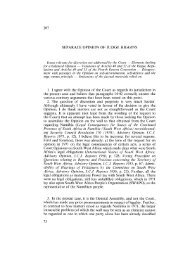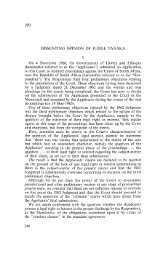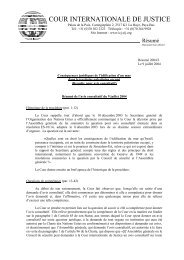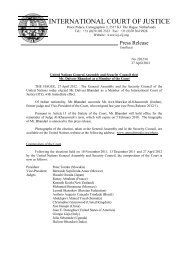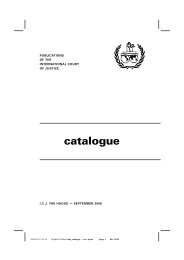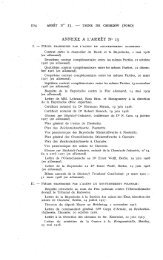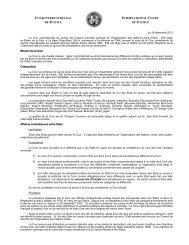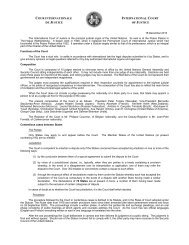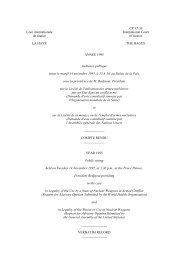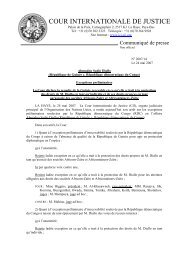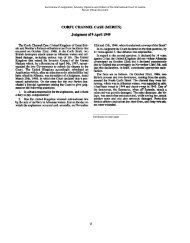botswana/namibia - Cour international de Justice
botswana/namibia - Cour international de Justice
botswana/namibia - Cour international de Justice
Create successful ePaper yourself
Turn your PDF publications into a flip-book with our unique Google optimized e-Paper software.
777. Thirdly, the Namibian Memorial refers to 'discussions ... held at Katima Mulilo' on 24<br />
November 1981 (Memorial, page 115, para. 282), and asserts that at this meeting Botswana<br />
did not 'claim ownership of Kasikili Island' (Memorial, page 115, para. 283.<br />
778. These assertions cannot be justified to the slightest extent by reference to the meeting<br />
which took place on 24 November 1981. The Minutes of the meeting appear in the Botswana<br />
Memorial, Annex 39. The agenda of the meeting was confined to local problems of<br />
neighbourhood and no reference was ma<strong>de</strong> to Kasikili/Sedudu Island. The Namibian<br />
Government asserts that the absence of reference to the island was because 'both parties were<br />
satisfied that Sidudu was part of Caprivi' (Namibian Memorial, p.115, para. 282). This is a<br />
mere assumption based upon a South African Defence Force minute three years later. The<br />
truth emerges clearly from the substantial Minutes of the 1981 Meeting.<br />
779. The logic of this entire section of the Namibian Memorial is that silence is always<br />
acquiescence on the part of Botswana. This artificial logic is carried to extraordinary lengths.<br />
Thus, when an inci<strong>de</strong>nt occurred in the southern channel in October 1984, the sequel was the<br />
meeting in Pretoria on 19 December 1984 between high level <strong>de</strong>legations from Botswana and<br />
South Africa. Whilst agreeing to a mechanism for peaceful resolution of the issue relating to<br />
the boundary, the Botswana <strong>de</strong>legation firmly maintained its position that Kasikili/Sedudu<br />
Island formed part of Botswana (see the Botswana Memorial, p. 77-9). This response is<br />
caricatured in the Namibian Memorial (page 116, para. 285) as marking 'the first clear-cut<br />
episo<strong>de</strong> of non-acquiescence by Botswana or any of its pre<strong>de</strong>cessors in title'.<br />
780. If this were such a change of position on the part of Botswana, and South Africa and its<br />
pre<strong>de</strong>cessors had been in possession since 1890, why was the South African Government<br />
willing to submit the issue to a procedure of peaceful settlement? This fact is particularly<br />
striking, given the contrast in military strength between the two neighbours, and, as the<br />
Namibian Memorial stresses, the fact 'that the South African Government consi<strong>de</strong>red control<br />
over Kasikili Island a national security matter' (Namibian Memorial, p.116, para. 284 in fine).<br />
781. The fact that eventually South Africa refused to implement the Joint Survey Report is<br />
hardly evi<strong>de</strong>nce of acquiescence by Botswana, as the Namibian Memorial appears to suggest<br />
(Memorial, pp.116-17, paras. 285-6).<br />
782. In conclusion the statement by Namibia, that the Pretoria discussions of 19 December<br />
1984 marked 'the first clear-cut episo<strong>de</strong> of non-acquiescence by Botswana or of its<br />
pre<strong>de</strong>cessors in title' (emphasis supplied), is distant from reality in two respects. First of all,<br />
Botswana had not 'acquiesced' and there had been no South African occupation or other<br />
initiative which would have called for any response. Secondly, the British Government, as<br />
pre<strong>de</strong>cessor in title, had not 'acquiesced' as the prolonged exchanges of the period 1948 to<br />
1951 unequivocally indicate.<br />
783. The reality, in historical terms, was as follows:<br />
- In the period 1890 to 1948 there had been no dispute relating to the island.<br />
- After the exchanges between the British and South African Governments in the period 1948<br />
to 1951, there could be no legal basis for acquiescence: the United Kingdom had affirmed its<br />
title.



